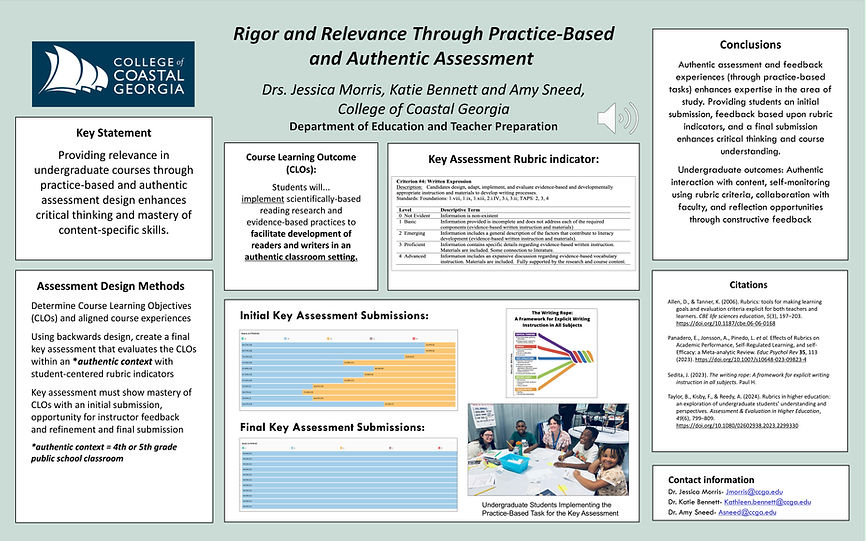Rigor and Relevance through Practice-Based and Authentic Assessment
Providing relevance through practice-based and authentic assessment in undergraduate courses enhances critical thinking. Join us to learn more about designing meaningful assessment!
Presented by:
Jessica Morris, College of Coastal Georgia

Katie Bennett, College of Coastal Georgia
Amy Sneed, College of Coastal Georgia
Abstract:
Providing rigor and relevance through authentic, practice-based assessments in undergraduate courses strengthens student's critical thinking skills. Through the design of student-centered rubrics and intentional critical thinking reflections, assessment practices are enhanced by providing the potential to receive timely and explicit feedback on their progress towards content mastery throughout the course. On-going instructor data collection and analysis of these authentic content experiences (practice-based tasks), strengthens the student learning experiences in both online and in-person courses.
Keywords:
Assessment Design, Practice-Based, Critical Thinking
Learning Outcomes:
1. Describe how student-centered rubrics can enhance key assessment practices
2. Determine how designing meaningful key assessments would impact critical thinking
3. Analyze how authentic content experiences (practice-based tasks) can enhance student learning experiences
Rigor and Relevance through Practice-Based and Authentic Assessment

Hear it from the author:
Transcript:
Welcome to our poster presentation Rigor and Relevance through Practice Based and Authentic Assessment presented by doctors Jessica Morris, Katie Bennett and Amy Snead from the College of Coastal Georgia. We have learned that providing relevance through practice based and authentic assessment in our undergraduate courses has enhanced critical thinking in our teacher preparation courses. Through the design of student center rubrics and intentional critical thinking reflections. Assessment practices are enhanced by providing the potential for students to receive timely and explicit feedback back on their progress towards content mastery throughout the course. Our ongoing instructor data collection and analysis of these authentic context experiences, which in our case are practice based tasks in fourth and fifth grade elementary schools, strengthens the student learning experiences in both online and in person courses.
Overall, utilizing student center rubrics allowed our students to be able to understand how they were being assessed on the key assessment, the final, if you will, that measured our course learning outcomes. It also helped us to design meaningful key assessments that would actually impact our students critical thinking and it allowed us to analyze how authentic content experiences can enhance the overall student learning experiences.
References
Brookhart, S. (2013). How to create and use rubrics for formative assessment and grading. ASCD.
Duckor B., & Holmberg C. (2017). Mastering formative assessment moves: 7 high-leverage practices to advance student learning. Association for Supervision and Curriculum Development.
Willems, P. P., Gonzalez-DeHass, A. R., Powers, J. R., & Musgrove, A. (2021). The role of authentic teaching cases and mastery approach goals in online pre-service teachers’ self-regulated learning. Educational Technology Research and Development, 69(2), 1003-1023. https://doi.org/10.1007/s11423-021-09972-9